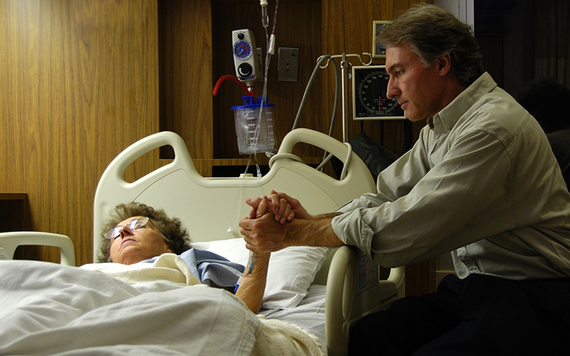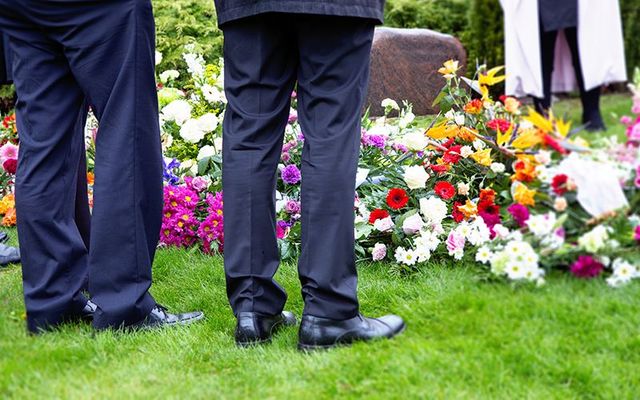How ready are you to face your own death or the death of someone you love? Kevin Toolis talks you through the Irish Wake and why it can help come to terms with death.
You cannot step twice into the same river, ever newer waters flow around and beneath your feet. And we cannot all go back to the island, listen daily to the cowboy songs and the ‘deaths’ on the radio, and live on and die in the last full gatherings of this ancient Celtic rite.
But we can carry much of the Irish Wake with us in our hearts. A rite that survived the fall of Troy and a thousand generations before the rise of the Western Death Machine can easily survive the retransplantation back to our cities of glass and concrete.
We need to find our way again with death. For a million years, our forebears managed to die all by themselves without hospitals, mortuaries, undertakers, prepaid funeral plans and the Western Death Machine.

Are you ready to face death? Image: iStock.
The Neolithic people who buried their dead on the high slopes of Slievemore 6,000 years ago probably coped with death better than we do. Why would our ancestors, who had only stones for tools, haul huge slabs of rock and build communal tombs that were used for centuries, unless they believed the bodies of their dead were important? Why would they have labored if they did not love their dead? And why did they go on living so close to the graves of their ancestors unless they believed in a bond between the dead and the living?
To be human is to be mortal, and to be mortal is to love, live and die amidst the lives of everyone around you on the island or in the city. And to embrace rather than deny our mortal fate.
Sonny wanted to live not die, but when he discovered he had no choice he knew how to die. And Sonny knew this, too: if you never know sorrow then you will never know love and if you never know death then you never know life.
On the island, death still calls in an ancient voice, louder and wiser, than our Whisper Death World. The island may be far away, but that voice is close if you want to listen.

Are you be ready to be placed in a coffin? Image: iStock.
Everything you need is within your grasp to rediscover the oldest lessons of humanity; how to love someone other than yourself, how to live through their death and how to face your own death with the aid of your community.
Waking with the dead is a good place to start learning those lessons again. If you can find yourself a decent Irish Wake to go to, just turn up and copy what everyone else is doing.
Don’t be nervous. Being there and taking part is the main thing. And don’t be shy. Go up to the bereaved, shake their hand and tell them: “Sorry for your trouble.” You will be surprised how glad they are to see you.
Death, remember, is our great leveler. We are all equal, all mortal, all brothers and sisters. There are no strangers, only fellow travelers.
Be sure to touch the flesh of the corpse for that ever wondrous ice-cube-in-a-rubber-glove feeling of a dead human. And use the touch to rediscover for yourself how we, the living, are everything and nothing like our dead kin.
Relax, have a cup of tea, a chat with other mourners, have a drink, a bit of food, and start getting yourself accustomed to the very ordinariness of it all. One day, for sure, you will be in the same sort of box. Dead on Arrival, somewhere.
Take your kids along too if you can. Learning how to die is just a foreign language – the younger you start the easier it gets. Children are usually especially beloved at funerals, for they are our future.
If you can’t find a wake begin with a little practice on your own: Make a phone call to a dying uncle and ask how he is. Go visit the sick, the terminally ill, and be prepared to talk about anything; their worries, their football team, their treatment, their hopes, the weather, what they think is going to happen to the plants in the front garden, their denial, the funeral arrangements, the World Series, whatever.
Don’t be too surprised if they either just talk endlessly about their illness or don’t mention it at all and talk about movies instead. Don’t wait. Go visit. Have that conversation now as you won’t talk about anything when they are dead.
Don’t go because you think you are being ‘charitable’ or ‘kind’ and will get some sort of brownie points in heaven. Go selfishly for yourself as well, to get a glimpse of what it’s like – dying – and to get a feel for the landscape. Offer yourself to help with another’s death. Practice will improve your own performance.
If you are the one doing the dying, don’t be afraid to share your death. Reach out and invite your relatives and old friends to see you to say goodbye. If you can face your own death, tell everyone you are dying. Ask for their help. Most of them will feel honored to be asked. If you can’t – don’t be too hard on yourself. You are allowed to choose. Denial or not, dying is exhausting, so get help where you can.
Find yourself a bean chabrach, a midwife of death, a son, a daughter, a husband, a wife, a friend, who will be with you in your dying and take responsibility when you are no longer able. The world will go on without you, so order your affairs, wills, properties, unresolved conflicts, as best as you are able to protect those you still love.
Forgive yourself, too, if you can’t.
If you can accept the mystery of yourself, the who you were and are still, and not the dream you thought you wanted to be, then do so.
If you are a relative or friend and care enough, be there for the dying days. There is nothing else in your life that will probably ever be as important. More real. Be there for the hour of death and remember to pray for your own in the moment.
*From "My Father’s Wake: How the Irish Teach Us to Live, Love, and Die" by Kevin Toolis. Copyright ©2018. Available from Da Capo Press, an imprint of Perseus Books, LLC, a subsidiary of Hachette Book Group, Inc. You can purchase online here.




Comments